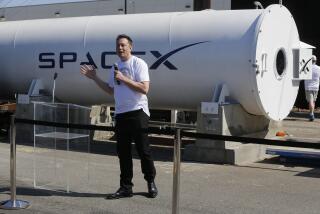Germans Looking Underground for Swifter Freight Delivery
- Share via
BOCHUM, Germany — It’s called the Achilles’ heel of the new economy, and nowhere is the weakness of delivery so apparent as in this city in the middle of the densely populated Ruhr River valley.
Truck traffic through the 40-mile corridor connecting nearly 6 million people and many of Germany’s heavy industries is so thick that the average drive time between the corridor’s far points, the cities of Duisburg and Dortmund, is an aggravating two hours. Backups sometimes stretch 200 miles, spilling out of the valley.
A few mouse clicks are all that is needed these days to buy anything from apples to automobiles, but timely arrival of goods is frustrated by the overwhelmed road network threading this congested stronghold of the old economy.
So when engineering professor Dietrich Stein and a few friends at Ruhr University proposed moving freight delivery to an underground system of automated cargo capsules traveling through pipelines, they were not dismissed as mad scientists concocting fantastic schemes for which there would never be funding.
In fact, the Ruhr region’s daily highway gridlock has made planners here open to unconventional solutions, and the professors’ project has engendered hope among transportation officials facing the seemingly impossible mission of keeping things moving.
With development money from the Science Ministry of North Rhine-Westphalia state, the professors of economics, engineering, construction, law, energy and environmental technology are building a prototype delivery drone and a test track. They expect to secure funding early next year for the first 45-mile stretch of tunnels.
“Every year businesses and industries in Germany waste 200 billion marks [about $90 billion] on time lost to traffic jams that delay workers getting to their jobs, supplies getting to manufacturers and purchases getting to customers,” Stein said. “If we could eliminate most of the trucks by creating an underground delivery system, that would free up the roads for car drivers.”
The Ruhr Valley is already such a maze of highways that transportation engineers have ruled out building new ones. Most of the existing roads traverse narrow gaps between apartment houses, stores and factories in the chain of cities that grew into a thick urban tangle after the rapid industrial development of the 19th century.
“The key to the success of this project will be integrating it into existing transportation systems, which we have done in designing the capsules to carry standard European shipping pallets,” explained Gerhard Wagner, a professor of mechanics and transportation technology, who is among the project’s half a dozen founders.
The Cargo Cap, as the professors have named the sleek drone intended to bring delivery into the modern era, is an electric motor-propelled cylinder a little more than 5 feet in diameter that can carry more than 1,200 pounds of freight, the equivalent of two standard cargo pallets.
The initial pipeline, to run east-west between rail terminals just outside the extremes of the corridor, is to be outfitted with sidetracks leading to 13 loading stations below major shopping centers and manufacturers. There the freight pallets can be electronically dispatched along rollers into a waiting elevator and lifted to the store or factory at ground level.
Eventually, the system could be extended to reach every business and household, replacing the need for overnight express, grocery and furniture deliverers and mail carriers. Departing capsules could carry away refuse and recyclables.
“Automated delivery will one day become a public utility that is as much taken for granted as indoor plumbing or electricity or telephone service is today,” said Stein, who has spent his career developing sewer and drainage systems.
The scientists’ test track will be completed by spring, and they forecast that the inaugural stretch could be in operation within two years of the start of construction. The only thing slowing down the project is the absence of firm financing. However, the system has been included in the master plan drafted by the recently reelected governor, Wolfgang Clement, who hails from Bochum and is, according to the professors, a fellow technology nerd.
The scientists estimate that the inaugural route and sidetracks will cost about $450 million to build, which would be reimbursed by user tolls rather than funded by taxpayers, who pay for new roads. That is only a bit more expensive than the same length of new highway at today’s prices, and the new system’s relative costs could drop over time as tunneling is more technology-driven than labor-intensive road construction.
The first stretch will be built under existing highway, so less disruption and public protest are expected, Stein said.
Cargo Cap also has the support of the state’s Institute for Economic Research in nearby Essen. The institute’s director, Paul Klemmer, initially thought the venture too grandiose. But the worsening traffic chaos and the development team’s claims of greater cost-effectiveness have won over the regional arbiter on projects worthy of public support.
“There is no above-ground solution for this region,” said Klemmer, who, along with Stein and Wagner, has been enlisted to push the project in a promotional CD-ROM presentation circulating among government and private agencies that might invest in the delivery system. “We can’t speak anymore of a coming collapse of the transport system because the breakdown is already here.”
Forecasts show that today’s bad situation will only get worse. By 2005, the cargo volume traversing roads in this region will have grown by 90% from its 1990 levels, Klemmer said.
That’s the fear of retailers who already cannot guarantee timely delivery.
“Customers want to know precisely when their purchases are to be delivered, and these days we are having trouble even keeping to the four-hour windows we ask of them,” said Gerhard Schnuerch, head of the regional warehouse for Quelle, Germany’s biggest mail-order business. “It’s our worst hurdle to customer satisfaction. People get very angry when they are asked to stay home all morning or all afternoon for a delivery that doesn’t come.”
Quelle dispatches about 100 trucks a day in North Rhine-Westphalia, Germany’s most-populous state with 18 million residents. A trip from the warehouse here to any point in the Ruhr Valley should take no more than 20 minutes when the roads are clear, but the trucks now need at least an hour and often two or three times that, Schnuerch said. He calculates that his company loses at least $70 an hour for each two-person driving team delayed by traffic.
He contends that frustrated retailers like himself are prepared to support the underground option by paying user fees and retrofitting loading docks.
“It has to be cost-neutral or businesses won’t use it,” he said. “But I don’t see how such a system as the professors are talking about could cost more than truck shipments.”
Major appliance and furniture retailers like Quelle also would save on personnel costs, managers believe, as the drones would require neither drivers nor traffic controllers. Each capsule would be programmed by the shippers for a preset stop along the pipeline, like a guided missile.
While Cargo Cap may seem futuristic, the concept predates World War II. The Third Reich created a subterranean mail system in Berlin, and Russia and Japan have underground pipelines that carry raw materials between mines and factories, Stein said. In the Netherlands, an unmanned shuttle is under construction to carry flowers and bulbs from Delft to Amsterdam’s Schiphol Airport for export without exposing them to the elements.
(BEGIN TEXT OF INFOBOX / INFOGRAPHIC)
Moving the Freight
Truck traffic through the densely populated Ruhr Valley of Germany is so heavy that the average driving time across the 40-mile corridor is two hours. A group of professors has formulated a plan to move freight to stores by using automated capsules that each carry more than 1,200 pounds of cargo to 13 stations along underground tunnels. A prototype drone is being built, and the group hopes to secure funding next year for the first stretch of twin tunnels.
Source: www.cargocap.de
*
Artist’s renditions of cargo capsule loading station (top) and capsule in tunnel (above).
More to Read
Sign up for Essential California
The most important California stories and recommendations in your inbox every morning.
You may occasionally receive promotional content from the Los Angeles Times.














